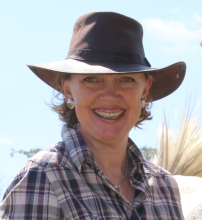After gaining a degree in Anthropology, Sophie went into television production directing her first documentary for Channel 4 when driving from London to Johannesburg. Having produced an INSET series for BBC Education, she set up wildlife films in Botswana and a BLUE PETER exploration of South Africa. She was filming in Kenya when she met Makorongo, a veteran of WWII working as a safari guide. He had a panic attack when a group of Japanese tourists walked behind his chair and explained himself by telling Sophie about his miraculous extraction from a Japanese prisoner of war camp.
Sophie's family moved from the Malay States to Tanganyika in 1919, with a resolve to grow pyrethrum and 'save the world from malaria'. She emigrated to southern Africa where she spent twelve years working as a wildlife artist between film contracts, travelling though twenty-one African countries. After founding an HIV/AIDs project, she became a trustee of The Waterberg Trust and is currently raising money to provide African schoolgirls with eco-sanitary pads. She married an Englishman and now lives on the south coast of the UK.



